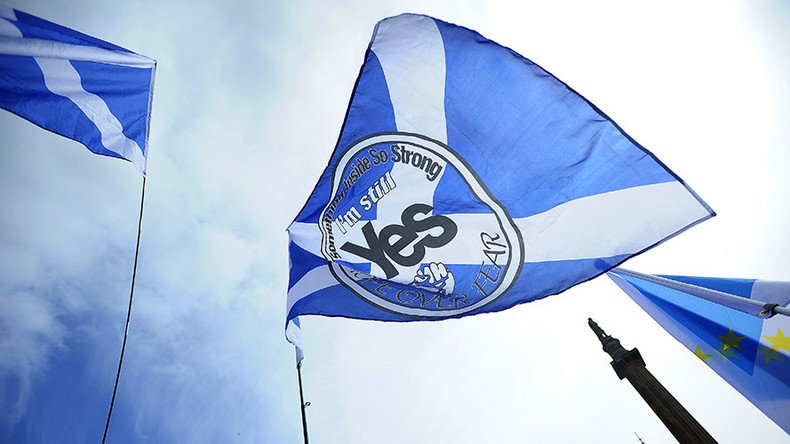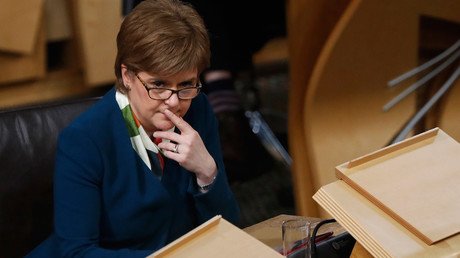Support for Scottish independence ‘higher than ever’... depending on which poll you believe

Support for Scottish independence is at an all-time high according to one independent poll. At the same time, two newspaper-commissioned surveys suggest Scots actually want to remain part of Britain.
According to a survey by ScotCen, the level of approval for independence is “much higher” than “ever existed beforehand.”
Experts believe the change in mindset comes as a “long-term consequence of holding the independence referendum in 2014.”
Backing for an independent Scotland was calculated at 46 percent in 2016, compared to just under 40 percent the year before. It was at around 33 percent in 2014, despite the ‘Yes’ campaign receiving 45 percent of votes in the referendum.
The age gap between pro- and anti-independence groups has also “widened somewhat,” according to ScotCen.
While less than one in five over-45s wanted an independent Scotland in 2012, the number jumped 14 points, to a third of all adults in that age group. Under-45s were also more in favor of independence, with number going from 28 to 47 percent.
“The nationalist movement in Scotland has never been stronger electorally,” ScotCen senior research fellow Professor John Curtice said in a press release.
“The outcome of the EU referendum appeared to be a perfect illustration of their argument that for so long as it stays in the UK, Scotland is always at risk of having its ‘democratic will’ overturned by England.”
However, he also warned that support for Europe has since declined, despite Scotland predominantly voting to Remain in the Brexit referendum.
“The commitment to the EU of many of those who voted to Remain does not appear to be strong enough that they are likely to be persuaded by the outcome of the EU referendum to change their preference for staying in the UK,” Curtice added.
46% of people in Scotland now support independence - the highest level recorded by ScotCen https://t.co/OmyAPaSwRv#indyref2pic.twitter.com/W5WVluVCiw
— ScotCen (@ScotCen) March 15, 2017
“There is a risk that linking independence closely to the idea of staying in the EU could alienate some of those who currently back leaving the UK.”
Nearly 70 percent of the Scottish population now identify as Euroskeptic, the figures showed.
“This impartial report underlines that our country is divided enough,” the Press Association reported the Scottish Labour Westminster spokesman Ian Murray saying.
“We must not be divided again by the [Scottish National Party’s (SNP)] obsession for a second independence referendum.
“Nicola Sturgeon doesn’t have answers on Europe and this report makes clear that Scotland’s attitudes towards this is much more complex than the SNP would admit.”
His comments came before a Survation poll for the Scottish Daily Mail showed radically different results to the ScotCen one.
Despite voting to remain in the EU, Euroscepticism in Scotland is now at the highest level we've seen https://t.co/NxZ3Wq2D5z#brexitpic.twitter.com/EHikAFKNtR
— ScotCen (@ScotCen) March 15, 2017
According to the newspaper’s inquiry, 46 percent of Scots are against a second independence referendum taking place before Britain leaves the European Union. More than 40 percent were, however, in favor and nine percent were unhappy with both options.
Meanwhile, a Times-commissioned YouGov poll saw 57 percent of Scottish voters back a united Britain, against 43 percent calling for an independent Scotland.
Latest headline voting intention for #indyref2 - No 57%, Yes 43%. Highest No lead since August 2014 https://t.co/VsZT4XE6tapic.twitter.com/h24wYleB8V
— YouGov (@YouGov) March 15, 2017
Scottish First Minister Nicola Sturgeon was adamant about a second indyref on Monday, but midweek reports showed her intentions to call for an independent Scotland’s EU membership had subsided.
Sources told the Telegraph the SNP leader is drastically changing her tack after reading the results of ScotCen’s survey.
May could stop IndyRef2
And it’s not just strategy that is being called into question.
The SNP’s Westminster leader Angus Robertson told Prime Minister Theresa May that a compromise to “protect Scotland’s place in Europe” in exit negotiations could cancel the need for a referendum at all.
“There may only be days, may only be weeks, but where all of our efforts are currently focused is trying to convince the UK Government to come to a compromise agreement protecting Scotland's place in Europe,” Robertson told the Guardian.
“If that road runs out and if we have to have that referendum, we will be turning our attention to making sure that we are making the case publicly, intellectually and in every other way so people understand the choice of a hard Tory Brexit Britain or a Scotland able to maintain its relations with the rest of Europe.”
Scottish Conservatives leader Ruth Davidson told the paper the SNP is merely “trying to break up Britain.”
“How can he say the SNP is focused on negotiations with the UK Government when Nicola Sturgeon has just broken off those talks to unilaterally declare another divisive referendum on independence?” she said.














